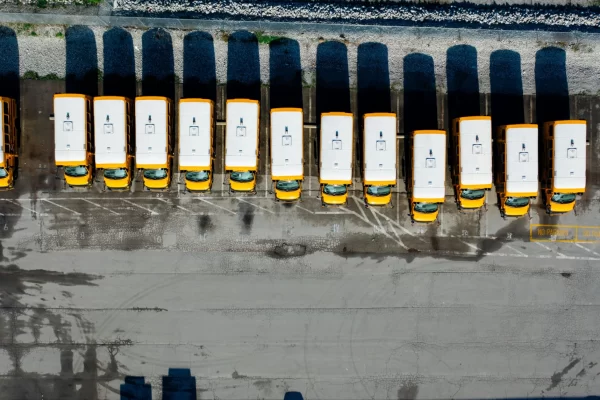Managing heavy equipment proficiently is challenging. Construction and heavy equipment businesses face many kinds of issues, ranging from theft prevention to operational cost control. GPS trackers provide a powerful solution, allowing fleet managers to monitor equipment usage, maintenance needs, and location in real time.
In this blog, we’ll look at the advantages of heavy equipment GPS trackers, discuss over the top options available, and Traxxis GPS’s expertise on how to select the proper tracker for your intended use.
Why You Need a Heavy Equipment GPS Trackers
Managing heavy equipment involves precision and foresight. GPS trackers have become necessary instruments in the construction and heavy equipment industries, addressing typical issues like as theft, underutilization, equipment hoarding, and expensive maintenance costs.
Using these devices enables you real-time insights and data-driven decision-making skills, which may impact fleet management.
Key Benefits for Construction and Heavy Equipment Industries
Theft Prevention and Recovery:
Each year, businesses lose billions of dollars in assets due to heavy construction equipment theft. GPS trackers provide real-time location updates, making it easier to retrieve stolen property faster.
Optimized Equipment Utilization:
Understanding how and when equipment is used can help managers better allocate resources, reduce idle time, and increase revenue and production. Utilization reports provide detailed insights into asset usage, further helping managers optimize fleet performance.
Reduced Maintenance Costs:
GPS trackers with built-in telematics can monitor your vehicles’ engine hours and usage, allowing you to schedule preventative maintenance and avoid costly breakdowns.
Improved Compliance and Safety:
Trackers can log data to guarantee regulatory compliance and that equipment is operated safely.
For additional convenience, many GPS tracking systems, including those offered by Verizon Connect, integrate QR codes on equipment.
Modern GPS Tracking Technology and Trends for 2025
The latest advancements include:
AI Integration: Improved insights for predictive maintenance and operational planning.
IoT Connectivity: Enabling seamless integration with other fleet management systems.
Enhanced Security Features: Geofencing and tamper alerts to prevent unauthorized use.
Cloud-Based Solutions: Easier access to data across devices.
Verizon Connect: One system that is gaining traction and offers both AI integration and IoT connectivity.
Top Heavy Equipment GPS Tracker Options
With so many hardwired GPS trackers on the market, it might be difficult to choose one that is right for you. Here are some of the best GPS tracking devices for heavy equipment, customized to different operational needs:
1. Geotab
Geotab stands out for its extensive data analysis options and tools, making it suitable for businesses trying to improve fleet performance. Its user-friendly dashboard provides actionable insights, allowing organizations to make informed decisions.
Key Features: Advanced telematics, configurable dashboards, real-time position tracking, and maintenance warnings.
Best For: Large fleets that require substantial data insights and integrations.
Unique Selling Point: Strong integration with existing fleet management software.
2. Azuga
Azuga is well known for its emphasis on safety and efficiency. Its user-friendly solution allows fleet managers to track vehicles and assets while encouraging safer driving practices.
Key Features: Driver behavior tracking, geofencing, maintenance reminders, and simple installation.
Best For: Small to medium-sized fleets that value safety, reliability and cost-effectiveness.
Unique Selling Point: A user-friendly interface with a focus on increasing driver safety.
3. Route4Me
Route4Me specializes in helping businesses streamline delivery and transportation processes. Its powerful algorithms assure effective routing, resulting in time and fuel savings.
Key Features: Route planning, live tracking, fuel efficiency analysis, and route history playback.
Best For: Companies that require comprehensive route planning for equipment delivery or transportation.
Unique Selling Point: Comprehensive route planning for equipment.
4. Webfleet by Bridgestone
Webfleet is a reliable solution for large-scale operations. Its strong tracking and monitoring features, combined with great customer assistance, make it a top choice for developing enterprises.
Key Features: Real-time location tracking, fuel monitoring, driver behavior analysis, and API integration.
Best For: Businesses looking for a high-performance, scalable solution.
Unique Selling Point: Industry-leading customer service and dependable performance.
5. Digital Matter
Digital Matter’s solid build is ideal for tracking assets in adverse conditions. It is perfect for non-powered equipment due to its extended battery life and consistent performance.
Key Features: Rugged hardware, worldwide connection, long battery life, and non-powered asset tracking.
Best For: Tracking non-powered assets such as trailers, trucks, containers, and heavy-duty equipment.
Unique Selling Point: Rugged construction hardware built for severe conditions.
How to Choose the Best GPS Tracker for Your Needs
Choosing the proper GPS tracker requires considering multiple factors to ensure that it satisfies what you require. Here are a few essential factors that can help your decision-making process:
Equipment Type and Tracking Requirements
Begin by determining what kind of equipment you need to track. For powered machines such as excavators or bulldozers, look for trackers with telematics features that monitor engine performance and use.
Non-powered assets, such as trailers or storage containers, should be outfitted with gadgets that have long battery lives and durable designs. Consider additional tracking requirements, such as geofencing for location management or real-time notifications for unlawful movement.
Fleet Size and Scalability
Your fleet size is an important factor in picking the best GPS tracker. If you run a small fleet, choose a system with simple installation and minimal setup. Prioritize solutions with scalability for bigger fleets, assuring long-term usability as your operations grow.
Integration with Existing Systems
To enhance efficiency, select GPS trackers that work flawlessly with your existing systems. This comprises fleet management platforms, equipment management software, maintenance scheduling software, and enterprise resource planning (ERP) applications. Integration automates data entry, saving time and reducing errors.
Budget and ROI Considerations
Consider both upfront and continuing costs. While the initial hardware price and subscription fees may vary, the long-term ROI should justify the expenditure. Factors such as reduced downtime, increased productivity, and improved security all contribute to a high ROI.
Customer Support and Ease of Users
Reliable customer support guarantees that the implementation goes smoothly and that you receive lasting assistance. Choose providers like Traxxis GPS Solutions who are known for their responsive service and training resources. A user-friendly interface also helps your team accept the technology and realize its full potential.
Compliance and Reporting Needs
For companies with demanding regulatory and reporting standards, make sure the GPS tracker includes thorough logs and reporting options. This helps to ensure compliance with local and federal regulations, avoiding potential penalties.
By carefully considering all of these factors, you can decide on a GPS tracker that meets your operating objectives, improves efficiency, and produces measurable outcomes.
Traxxis GPS: Partnering for Your Success
Traxxis GPS is a recognized partner for heavy equipment GPS tracking, providing comprehensive solutions to fit your business needs. Traxxis GPS has years of experience in the heavy machinery and fleet management market and offers:
Tailored Solutions:
Each fleet is unique, and Traxxis GPS specializes at creating customized tracking solutions. Whether it’s theft prevention, route optimization, or maintenance tracking, they make sure their solutions work seamlessly with your operations.
Integration with Industry Leaders:
Traxxis GPS works with leading suppliers such as Geotab, Azuga, and Digital Matter to provide best-in-class technology. This means you’ll have access to cutting-edge GPS trackers supported by the knowledge of worldwide experts.
Expert Consultation:
Not sure where to begin? Traxxis GPS offers experienced advice to help you choose the best devices for your fleet. Their team of experts helps you get the most out of your investment by offering solutions that are suited to your specific needs.
End-to-End Support:
From implementation to ongoing technical assistance, Traxxis GPS is with you every step of the way. Their fast customer support team guarantees that operations run smoothly and with minimal downtime.
Proven Results:
Businesses who have partnered with Traxxis GPS have experienced substantial increases in efficiency, fewer theft incidences, and improved fleet management overall for many customers. With their dependable solutions, you are free to focus on building your business while they handle the technical aspects.
By choosing Traxxis GPS Solutions, you get far more than just a tool, you receive a partner who is committed to your success.
Case Studies: Success Stories with Traxxis GPS Solutions
Case Study 1: Brown Dog Carriers Reduces Idling Time and Simplifies Compliance
Brown Dog Carriers used Geotab’s platform to monitor idle time and improve safety procedures. By analyzing data, they were able to significantly reduce idling, resulting in fuel savings and increased compliance with industry regulations.
Case Study 2: City of Port Colborne Enhances Fleet Safety and Efficiency
The City of Port Colborne utilized Geotab’s telematics systems to provide real-time visibility into fleet operations. This project increased safety, expedited claims processing, and optimized salt usage during snow events, resulting in cost savings and environmental benefits.
Case Study 3: Northern Logistics Boosts Driver Performance by 28% with Geotab
Northern Logistics used Geotab’s telematics platform to track driver behavior and optimize routes. This method resulted in a 28% increase in driver safety scores, improved operational efficiency, quicker asset inspections, and overall improved productivity.
For more success stories, you can explore the following resources:
Conclusion
Heavy equipment GPS trackers are no longer a luxury; they are a must-have for businesses looking to remain competitive. Investing money in a reliable tracker can help you improve security, streamline operations, and create long-term cost savings.
Whether you manage a small fleet or a large enterprise, Geotab, Azuga, and Digital Matter provide reliable solutions to match your requirements. Partnering with experts like Traxxis GPS guarantees that you have the greatest tools to address fleet management concerns.
Take the first step toward smarter fleet management today. Contact Traxxis GPS Solutions to explore tailored solutions that fit your needs!
Frequently Asked Questions (FAQs)
What is the average cost of a heavy equipment GPS tracker?
GPS trackers are typically priced between $100 to $500 for hardware, with monthly subscription fees ranging from $15 to $50. Advanced solutions may be more expensive, but they provide a considerable ROI through increased efficiency, visibility and asset security.
Can GPS trackers work for unpowered equipment?
Yes, GPS trackers such as those from Digital Matter are designed for non-powered assets, with long battery life and durable construction. These devices provide reliable tracking for equipment such as trailers and containers, even in distant or hostile environments.
How do GPS trackers improve maintenance?
GPS trackers offer predictive maintenance by tracking engine hours and usage patterns, which reduces the chance of breakdowns. This data-driven strategy reduces downtime and increases equipment lifespan.
Are GPS trackers difficult to install?
Most latest GPS trackers, including those from Geotab and Azuga, have simple plug-and-play settings. These user-friendly designs allow for rapid and easy installation without the need for technical expertise.
What industries benefit the most from heavy equipment GPS trackers?
GPS trackers are particularly beneficial to the construction, mining, logistics, and agriculture industries. These tools maximize equipment utilization, improve safety, and minimize theft, resulting in increased productivity across many tasks.





